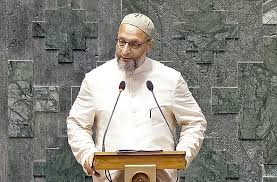Owaisi: When water, blood can’t flow together, why play cricket against Pakistan?

Asaduddin Owaisi, chief of the All India Majlis-e-Ittehadul Muslimeen (AIMIM), has stirred political debate by criticizing India’s cricket ties with Pakistan. He asked a direct question: “When blood and water can’t flow together, why play cricket?”
His remark refers to Prime Minister Narendra Modi’s earlier statement that “blood and water cannot flow together,” made after terror attacks linked to Pakistan-based groups. Owaisi believes the government contradicts its own position by allowing cricket matches with Pakistan in international tournaments.
A Stand Against Double Standards
Owaisi’s comment came ahead of an upcoming India-Pakistan match in an ICC tournament. While fans eagerly await the match, he finds the government’s stance confusing and troubling.
“If our soldiers are dying at the border, if terror attacks continue to target our forces, how can we justify playing cricket like nothing happened?” he asked.
He points to a larger issue: the government’s selective engagement with Pakistan. Cultural, diplomatic, and trade relations remain suspended. Yet, cricket continues on the global stage.
Cricketing Ties Only Through Tournaments
India and Pakistan have not played a bilateral cricket series since 2012–13. Their encounters now occur only in multi-nation events such as the Asia Cup and T20 World Cup. The Board of Control for Cricket in India (BCCI) has said that bilateral matches won’t resume without government approval.
This policy appears firm. However, Owaisi believes it lacks consistency. If border security is a priority, why make an exception for cricket?
The Politics of Sport
Critics argue that Owaisi’s statements are politically motivated. As a vocal opponent of the ruling party, he often challenges BJP policies. Yet, many believe he raises an important point. Families of martyred soldiers have echoed similar sentiments, questioning why sporting ties persist when tensions remain high.
On the other hand, some say that sport should rise above politics. They argue that cricket can serve as a bridge, not a battlefield. However, this argument loses strength when all other forms of engagement are blocked.
Money Talks in India-Pakistan Matches
One major reason for continued cricketing ties is simple: revenue. India-Pakistan matches attract huge audiences, both in stadiums and on television. The commercial value of these games is enormous.
- Broadcasters pay top prices for rights to these matches.
- Sponsors line up for airtime, knowing millions will watch.
- Advertisers benefit from record-breaking viewership.
This financial incentive makes it difficult to cut cricket ties completely. Owaisi’s comments challenge whether profit should outweigh national principles.
Public Opinion Is Split
Indian citizens remain divided on this issue.
- Some support a complete ban on any engagement with Pakistan, including cricket.
- Others view the sport as separate from politics.
- A large section of the public enjoys the matches but feels conflicted about the message they send.
Owaisi’s remarks add fuel to this ongoing debate. He pushes the public and the government to examine their stance more closely.
A Tightrope for the Government
The Indian government faces a tricky balancing act. It refuses to resume diplomatic talks or bilateral series but permits matches in international tournaments. This approach keeps global commitments intact while maintaining a hardline posture.
Yet, this position allows criticism from leaders like Owaisi. He questions whether the government truly follows its “no engagement” policy or picks and chooses based on convenience.
Conclusion: More Than Just a Match
Asaduddin Owaisi’s statement does more than question cricket matches. It highlights a broader inconsistency in India’s Pakistan policy. While diplomacy, trade, and culture remain frozen, cricket continues — and that creates confusion.
His words — “When blood flows, how can we play cricket?” — ask us all to reflect.
Is cricket just a game? Or has it become a tool with political, emotional, and ethical implications? In this climate, every ball bowled between India and Pakistan carries more than just sporting weight — it carries the burden of history, grief, and national pride.






